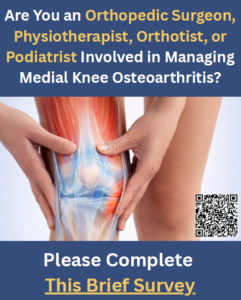
BAPO Course – Action Centred Leadership

by BAPO Admin

by BAPO Admin
by BAPO Admin
by BAPO Admin
by BAPO Admin
Over the past decade, we’ve seen a major shift from plaster-based workflows to digital fabrication.
The promise of a faster turnaround, better reproducibility, and improved patient experience is the usual hook, but in reality, many clinics discover that digital fabrication introduces new complexities, not fewer. Digital doesn’t automatically mean simple – it means different
This webinar’s goal is simple: to walk through the entire digital fabrication workflow, step by step, and openly discuss what works well, what commonly goes wrong, and how those challenges can be mitigated.
We’ll also talk about why many clinics choose to work with a central manufacturing partner that can support them in the transition to a digital fabrication workflow.

by BAPO Admin
Are you an Orthotist involved in managing medial knee osteoarthritis?
We would like to invite you to take part in a research study conducted by the University of Stirling exploring how isolated and/or medial dominant medial knee osteoarthritis is currently managed by healthcare professionals in the UK.
Participation involves completing an anonymous online survey which will take approximately 10–15 minutes to complete. At the end of the survey, you may optionally provide your contact details if you are willing to take part in a follow-up interview.
Participation is entirely voluntary. The study is being conducted by the University of Stirling and is not affiliated with the NHS, and participation or non-participation will have no impact on your professional role.
For further information or to take part, please follow the link below or contact the researcher directly: francesca.muratore@stir.ac.uk
Thank you for considering taking part.

by BAPO Admin
These awards are a way of celebrating and showcasing the quality improvement work of all AHPs, registered and support workforce, learners, and educators, across all sectors in the United Kingdom.
Nominations are open to anyone in the AHP family; our academic education partners, learners doing projects or dissertations as part of their education, support workers and registered staff who undertake projects relating to clinical services or professional activities.
🌳 TREE indicates the nomination categories available, and its branches represent our themes that include; people, spread and adoption/adaption, co-production, impact, and outcome:
T: Transfer of knowledge, experience or learning to someone else
Nominate an individual or team who have shared their knowledge, experience, and learning to help others progress their QI skills. This could be a QI champion or ambassador.
R: Reuse, spot a great QI idea, adapt and implement it in your area
Nominations for this category are for projects that delivered an improvement and change, adopted and adapted for excellence from an original innovation elsewhere, to avoid reinventing the wheel.
E: Everyone, involving stakeholders, patients and public to ensure sustainability
Nominations for this category are for projects where inclusivity and accessibility were considered, and co-production is central from design to delivery.
E: Effectiveness, demonstrating impact on outcomes
Nominations for this category are for projects that demonstrate clear measurable improvement for service users or staff, translating evidence into practice and delivering data driven outcomes. This could be streamlining services, financial or cost savings, improves recruitment and retention of staff.
An expert judging panel from across the national AHPQI network has been put together. Nominations will be judged during April and May.
We will be celebrating the winners of each category at an online virtual awards event on Wednesday 17th June from 12:30 to 13:45. The winners will be showcasing their work with a presentation.
Nominations open now
Nominate an individual, a team, or yourself, by completing the online nomination form, before 5pm on Friday 27th March 2026. Repost and share widely. https://lnkd.in/eXXrcrWJ
This is also a good way of shining the light on our profession and what we do. Let’s bring the awards home.
If you have any questions, email us at alliedhealthqi@gmail.com
by BAPO Admin
We are delighted to share that applications are now open for the Chief Sustainability Officer’s (CSO) Clinical Fellow Scheme 2026–27, sponsored by NHS England and managed by the Faculty of Medical Leadership and Management (FMLM). This prestigious 12‑month leadership fellowship offers clinicians with a passion for sustainability the opportunity to work at the centre of national improvement, shaping how the NHS embeds net zero principles into care delivery.
The scheme welcomes applications from a wide range of professions, including allied health professionals, making this an excellent opportunity for BAPO members who are keen to develop as future leaders in sustainable healthcare. Fellows will be seconded from their current roles to work on high‑impact national projects, engage with senior NHS leaders, and build advanced skills in leadership, policy development, project management, research, communication, and system‑level collaboration.
Why apply?
Fellows will:
More information & full details:
CSO Information Pack 2026–27 (FMLM):
Chief Sustainability Officer’s Clinical Fellow Scheme | www.fmlm.ac.uk to apply or contact, Chiazoka Mary Ezeuzo, BAPO’s Public Health and sustainability Lead; Chiazoka.ezeuzo@bapo.com
by BAPO Admin

Orthopaedic treatment and care in times of crisis
OTWorld 2026 provides impetus for crisis-proof care structures
As the world’s most important meeting place for modern orthopaedic treatment and care, OTWorld 2026 will put key future issues in healthcare on the agenda. From 19 to 22 May 2026 in Leipzig, the OTWorld World Congress will address the question of how orthopaedic treatment and care can be reliably provided in times of crisis and conflict. The focus will be on supply chains that enable people to remain mobile, self-determined and involved even under exceptional circumstances.
Crisis and conflict situations place special demands on healthcare systems. Injuries require effective acute care, early, quality-assured medical aids, and closely linked rehabilitation. Orthopaedic treatment thereby often begins in the acute phase, accompanies the transition to rehabilitation and forms the basis for the long-term effectiveness of therapeutic measures. This creates continuous care pathways that promote a return to a self-determined life.
The congress specifically addresses this systemic perspective. In a symposium on rehabilitation in conflict situations, experts from the fields of medicine, rehabilitation and care practice will discuss how supply chains can be made resilient and how phase-related and cross-sector treatment pathways can be successfully implemented even when there are large numbers of seriously injured people. Topics include preparation for emergencies, accelerated rehabilitation concepts in exceptional situations, and the transition from joint replacement implants to external prostheses after amputation.
Another symposium will emphasize the European perspective. The focus will be on surgical approaches to treating war injuries, strategic considerations for civil-military cooperation, and the further development of prosthetics and orthotics in highly fluctuating care conditions.
As the world’s largest meeting place for modern orthopaedic treatment and care, OTWorld makes it clear that prosthetics and orthotics are a central component of efficient healthcare systems. Prostheses, orthoses and wheelchairs support mobilisation from the outset and enable rehabilitation, participation and quality of life. The value of interdisciplinary and internationally networked care structures is particularly evident in times of crisis and conflict.
Training meets practice and market
The congress focuses on three main topics: rehabilitation, training and integrative care. The programme is complemented by contributions on prosthetics, orthotics, orthopaedic footwear technology, compression therapy, digital transformation, medical aid research and global care strategies. It thus brings together the entire range of training opportunities for all those involved in orthopaedic treatment and care under one roof.
Parallel to the World Congress, the International Trade Show showcases the entire spectrum of modern orthopaedic treatment and care – from innovative technologies and products to practical solutions for different care settings.
A special focus is on prosthetic care after amputation. OTWorld offers a globally unique overview of the corresponding care options: prosthesis manufacturers present their solutions as well as concepts for different care realities – even under difficult conditions in crisis regions.
Experienced care centres introduce themselves and share their practical experience, including Superhumans from Kiev, Ukraine, with insights into the care of war wounded. Aid projects such as Pro Uganda also provide insights into their work and show how sustainable care structures can be established in different regions.
In addition, organisations that train specialists and that are urgently needed locally in the provision of medical aids, including Human Study e.V., will be presenting themselves. They will illustrate how training, knowledge transfer and international cooperation contribute to strengthening supply systems in the long term.
The World Congress and Trade Show combine further training, exchange and market overview, making OTWorld the central meeting place for all players in the field of orthopaedic treatment and care.
Access to OTWorld 2026
The ticket shop for OTWorld 2026 is now open. OTWorld full tickets (OTWorld COMPLETE) are available, which include access to the World Congress and the International Trade Show. An early bird rate is available until 31 March, offering savings of up to 80.00 EUR. Discounted day tickets are further available for pupils, students and trainees – with a reduced OTWorld COMPLETE ticket at 89.00 EUR and a reduced OTWorld TRADE SHOW ticket at 21.00 EUR (valid proof of eligibility must be presented). A special Trade Show Group ticket at a reduced ticket price of 29.00 EUR can be recommended for visitor groups with a minimum of four attendees who would like to attend the International Trade Show, including all workshops (exhibitor and congress workshops). Separate two-day tickets are also available for participants of the Youth Academy for Technical Orthopaedics (JA.TO). An early bird rate with a saving of 10.00 EUR is available until 31 March.
Further information on the congress programme is available online here. The ticket shop can be accessed here.
Further information
About OTWorld
About Leipziger Messe
Press contacts:
Anja Hummel
Press Contact for OTWorld
Leipziger Messe GmbH
Phone: +49 (0)341 678-6528
Email: a.hummel@leipziger-messe.de
Ruth Justen
Press Contact for OTWorld and
German Association of Orthopaedic Technology (BIV-OT)
Phone: +49 (0) 231 5570-5052
Mobile: +49 (0) 151 2805-2860
E-Mail: ruth.justen@biv-ot.org
by BAPO Admin

Dear Colleague
You might be aware, through recent consultation meetings, that the University of Derby has been reviewing the viability of its Prosthetics & Orthotics Apprenticeship provision, due to recent low numbers. We have been delighted by the response of the industry to this consultation and the support that has been shown for the continuation of this delivery.
We are pleased to confirm the commitment from the University to continue these programmes and we are now opening our recruitment for September 2026. We would like candidate details by the end of June if possible but can be more flexible if required.
Information on our Level 3 Technician Apprenticeship can be found on this web link – https://www.derby.ac.uk/apprenticeships/apprenticeship-courses/level-3-prosthetic-and-orthotic-technician-apprenticeship/
Information on our Level 6 Clinician Degree Apprenticeship is here – https://www.derby.ac.uk/apprenticeships/apprenticeship-courses/prosthetics-and-orthotics-degree-apprenticeship/
We are hosting a webinar for each programme to give you information on how to fund and support apprentices and information on each programme via separate sessions below. Please complete a booking for one of the sessions and we will then send you an invite to the meeting.
We have also been informed by NHS England that they will be providing funding that will be available to support the back-fill of roles during the apprenticeship. We will send another email with confirmation of this funding as soon as it has been announced formally.
The British Association of Prosthetics and Orthotics (BAPO) was established to encourage high standards of prosthetic and orthotic practice. It is committed to Continued Professional Development and education to enhance standards of prosthetic and orthotic care.
BAPO Ltd. is a fully owned subsidiary of the Association, company number SC270569
British Association of Prosthetics and Orthotics (BAPO)
Clyde Offices
2nd Floor
48 West George Street
Glasgow
G2 1BP
Tel: 0141 561 7217
Email: enquiries@bapo.com
Opening Hours:
Mon – Thurs: 9:00am – 4:00pm
Fri: 9:00am – 12 midday